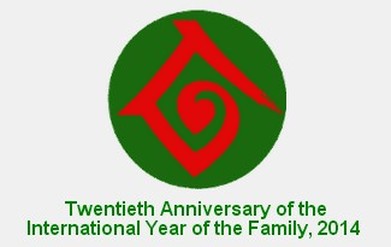響應國際家庭年20周年
2014年是國際家庭年成立20周年。全球各國政府及民間組織都把握這個機會重申家庭的重要。在政府當局向立法會的今星期四(1月23日)福利事務委員會提交的文件中提及,重視家庭是本港社會的核心價值。當局會繼續與社會各界協力締造有利家庭的環境。(文件在此)。
此外,我們從今年的施政綱領中知悉政府會透過家庭議會在全港推動各項活動響應國際家庭年20周年,具體項目包括(a) 在 2014年 於全港推行一連串的活動,以彰顯家庭的重要性 ;(b) 在 2014年 5月15日國際家庭日舉辦家庭研討會,並於 2014年第四季舉辦區域性的家庭研討會,以提高社會對家庭事務的認識 ,以及促進跨代共融和工作與家庭平衡;及(c) 製作新的家庭教育教材,以配合新手父母家庭和新來港家庭的需要。教材預期於2014年第三季推出。
而維護家庭基金同樣多年來一直在港推廣家庭價值,故此我們亦會在五月期間,舉行第三屆國際家庭日家庭價值研討會 ,以及於5月18日在九龍區,參與響應一個由聯合各界組織的網絡所舉行的大型家庭巡遊節目。我們在此亦協助呼籲,邀請各個社會服務機構一起動員參與。如有興趣得到此節目的資料,以決定會否和我們一樣,參與支持的話,歡迎讓我們知道。
維護家庭是全球公民社會的工作,故我們亦聯同全球60多個國家的超過200間民間組織,加入了一項名為 "Declaration of the Civil Society on the occasion of the 20th Anniversary of the International Year of the Family" 的宣言,以重申維護家庭基金支持和肯定家庭的重要,確認家庭對兒童及各家庭成員的重要。以下是這宣言的全文:
Declaration of the Civil Society on the occasion of the
20th Anniversary of the International Year of the Family
The representatives of the civil society organizations, academics and policy makers,
Acknowledging the right to found a family, as described by the art. 16 of the Universal Declaration of Human Rights,
Recognizing that, as basic and essential building blocks of societies, families have a crucial role in social development, bear the primary responsibility for the nurturing, protection, education and socialization of children, as well as instilling values of citizenship and belonging in the society, and provide material and non-material care and support to its members, from children to older persons or those suffering from illness, sheltering them from hardship to the maximum possible extent,
Recalling that this social protection function performed by families is especially important in times of increased uncertainty and vulnerability, when families find it more and more difficult to fulfil these multiple roles and tackle all responsibilities entrusted to them,
Emphasizing that family-focused policies have proven both valuable and efficient in many areas of social development, and that the very achievement of Millennium Development Goals depends on how well families are empowered to contribute to it,
Expressing the will to work closely with the United Nations Department of Economic and Social Affairs in a coordinated manner on family-related issues, including the preparations for the twentieth anniversary of the International Year of the Family.
- 1. Welcome the call made by United Nations to celebrate the forthcoming twentieth anniversary, in 2014, of the International Year of the Family, noting the opportunity it provides to revisit family-oriented policies as part of overall development efforts, supporting its objective to aim at responding to challenges faced by families and continuing to guide national efforts that benefit families worldwide and to integrate a family perspective by introducing a family impact report or assessment as a standing and compulsory part of policymaking;
- 2. Urge Member States to enhance and strengthen family mainstreaming in policy making at all levels, considering the impacts of socio-economic policies on families; to develop, promote and implement family-friendly policies aimed at providing sustainable, affordable and quality living conditions for families; and to empower families and recognize their role in social cohesion and economic development;
- 3. Invite Member States to recognize the right of families to sufficient resources and social assistance and the right to live in a manner compatible with human dignity, recalling that this is a common vital issue for single-parent, large and immigrant families; to develop, promote and implement policies aimed at ending child poverty through the eradication of family poverty, and encourage social, economic and educational policies to prevent intergenerational transmission of poverty; and to promote the provision of integrated services for families and family-friendly taxation policies and practices, including reduced taxes on goods and services for early childhood products and services;
- 4. Request Member States to recognize and communicate the value of balancing family and work in the economy and in society; to develop, provide and communicate comprehensive well-resourced and flexible parental leave entitlements, to promote skill development and learning systems throughout the life course of the family and in periods of transition, to facilitate parents’ re-entering the labor market, and to enhance dialogue and partnerships between social policy makers and relevant stakeholders, including families, family associations, business sector, trade unions and employers to develop and improve family-friendly policies and practices in the workplace;
- 5. Encourage Member States to facilitate intergenerational solidarity, quality couple and family relationships, parenting programmes; high-quality childcare and other ancillary services which support families; promote and develop active measures to support the psychological well-being of children and youth with sensitivity to family situations; prevent violence, addictions and juvenile delinquency; and promote school to work transitions and young adults’ economic security to facilitate family formation and stability, particularly among those with insecure socio-economic resources; as well as to promote and develop public policies concerning the support to the elder members of the family, especially in situations of particular need such as cases of Alzheimer or similar diseases.
就讓我們一起在2014年的開始,藉這特別的機會,共同關心家庭價值議題。

